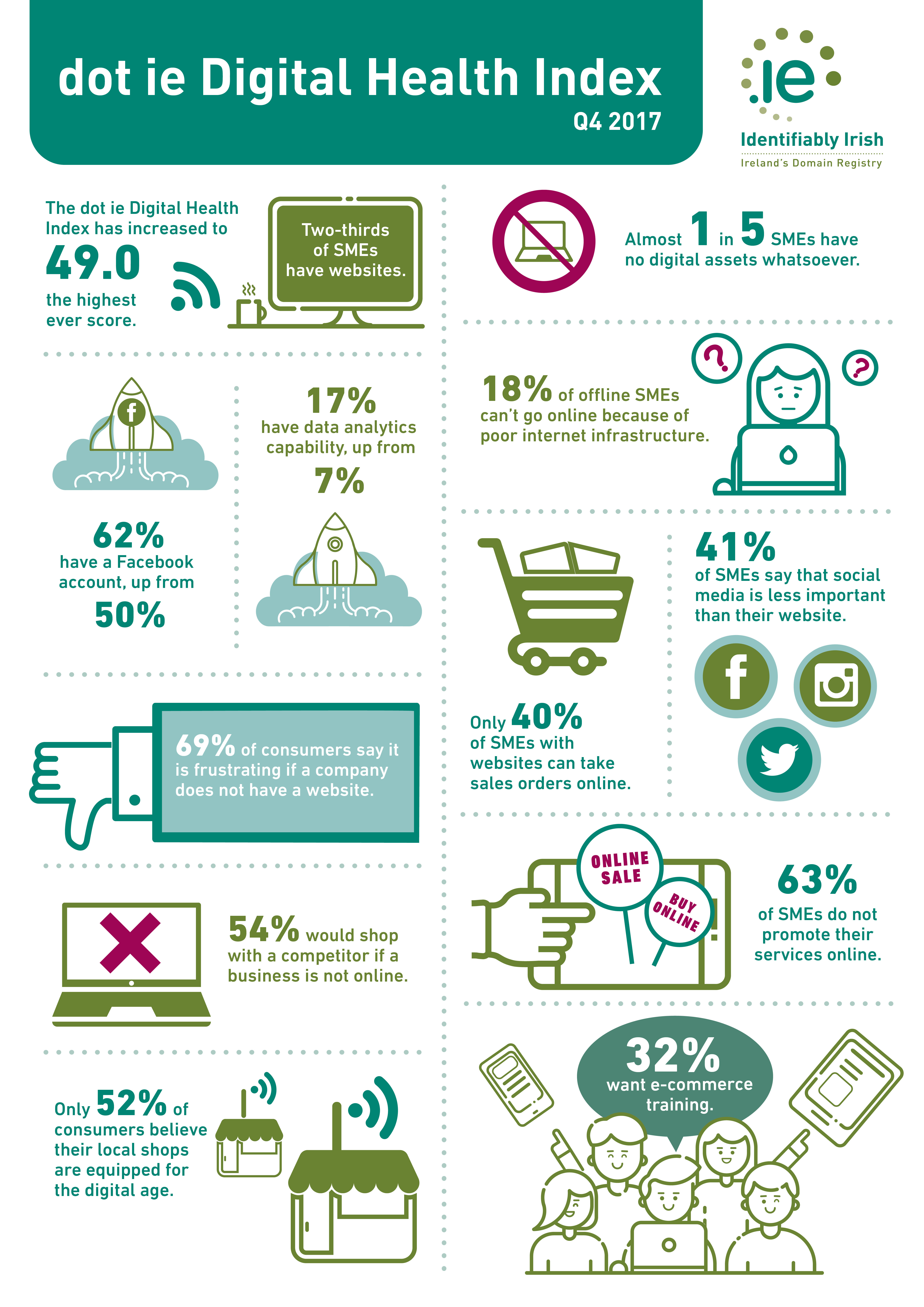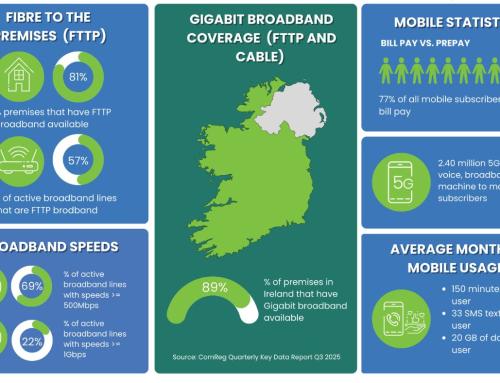The latest dot-IE Digital Health Index, published today is 49.0, up from 45.4 in March of this year.
The dot ie Digital Health Index is a biannual report published by the IE Domain Registry, which assesses the number and quality of digital assets owned by Irish SMEs, such as websites, social media pages and e-commerce tools. Despite ongoing issues with internet infrastructure and a persistent low uptake of e-commerce, today’s report recorded the best score for Ireland’s overall digital health since research began in 2014.
Exactly two-thirds of Irish SMEs have websites. An increasing number are using social media, particularly Facebook (62 percent, up from 50 percent), while more businesses are using data analytics to interact with and learn about their customers (17 percent, up from 7 percent). SMEs are also more confident in the quality of their digital assets and their contribution to business.
The report reveals that Irish SMEs are lagging behind their customers when it comes to an appreciation of the importance of ecommerce. More than half of those without a website say that they don’t need one, yet almost 70 percent of consumers said it is ‘frustrating’ if a business does not have a website. Two-thirds say a business looks ‘outdated’ if it does not have one, and nearly 30 percent do not even trust a business that does not have a website. Furthermore, 59 percent of consumers said that if a business has no online presence, they would be less likely to use their services or do business with them offline.
Online Businesses Make More
The benefits are tangible: the IEDR’s research shows that, on average, an SME with a website receives an additional 25 jobs a year, each worth an average of €1,073 for a total additional revenue take of €26,825 a year.
Almost 1 in 5 Irish SMEs have no digital assets whatsoever: neither a website, nor any form of social media presence. Of those, 20% say that they are impeded from online activity by poor internet connection. 14 percent of Irish SMEs rate their internet connection as ‘poor’ or ‘very poor’, a figure that rises to 25 percent in Connacht and Ulster.
But while there is room for improvement, the record Digital Health Index is an indication of major strides in recent months. While only 40% of Irish SMEs with websites can take sales orders, it is a noteworthy improvement on just 30% in the last wave of research only six months ago, indicating that SMEs are realising the benefits of selling online.
And almost a third of Irish SMEs want more digital skills and e-commerce training.
The report is authored by IEDR, the IE Domain Registry which manages Ireland’s .IE national internet domain, .IE. David Curtin, Chief Executive of IEDR, said the increase in the overall score of the dot ie Digital Health Index is good news, but big changes are needed before Ireland can become a major e-commerce player.
David Curtin, Chief Executive of the IE Domain Registry
“It is encouraging to see the dot ie Digital Health Index hit its highest ever score. Generally speaking, SMEs are actively embracing the benefits of an online presence and its power to grow revenues, improve customer relations, and analyse market behaviour.
“However, nearly 1 in 5 SMEs remain completely offline despite almost half of them acknowledging the importance of a website in some way. Our research has shown time and time again that while many businesses do not see a need to have a website of their own, the majority of consumers strongly disagree. In fact, a business with no online presence, or even a poorly designed one, is likely to be damaging its offline reputation.
“We live in an age of convenience. Consumers are tech-savvy but can be time-poor. They expect to be able to research and buy from businesses online 24/7. Offline SMEs will lose out to their competitors.
“Going online, building a website and engaging in e-commerce, even using third-party platforms or products, is not as complicated as it was ten years ago. There are many inexpensive, often free, easy-to-use tools that can have you marketing and selling your product to customers online in as little as a few hours.”
Call for Digital Skills and Mentorship Programmes
Mr Curtin also highlighted the broadband issues in the report, and called for a national rollout of a cross-industry digital skills programme for micro-businesses that have begun their digital journey, but need help to access Ireland’s growing e-commerce market. He called on the Local Enterprise Offices to operate a ‘buddy system’ that pairs up businesses with digital experts in their local area.
“Beyond educating SMEs in the benefits of e-commerce and digital business, there are ongoing infrastructural issues that must be addressed as a matter of urgency. Access to Ireland’s broadband network, while vastly improved on a decade ago, is still limited in many rural parts of the country. For a quarter of all SMEs in Ulster and Connacht in 2017 to describe their connection as ‘poor’ illustrates the extent of the digital divide.
“Ireland will not become a major e-commerce player overnight. Industry and Government must continue to work shoulder-to-shoulder to ensure that SMEs in all regions of the country have access to a modern, high-speed internet connection that allows reliable access to the global digital marketplace. The research indicates that e-commerce awareness is no longer a major issue. Going forward, resources must be targeted at improving the digital sales skills of online businesses, who already understand the benefits of an online presence, through digital skills and mentorship programmes.”
Some other key findings from the Digital Health Index report:
- 78% of SMEs said their website was important in generating new business and sales;
- 41 percent of SMEs say that social media is less important than their website;
- Nearly two-thirds (63 percent) of Irish SMEs do not promote their services online. Among those that do, the average monthly spend is €144;
- Paradoxically, almost half of SMEs (47 percent) without a website acknowledge the importance of a website in generating increased business awareness.








